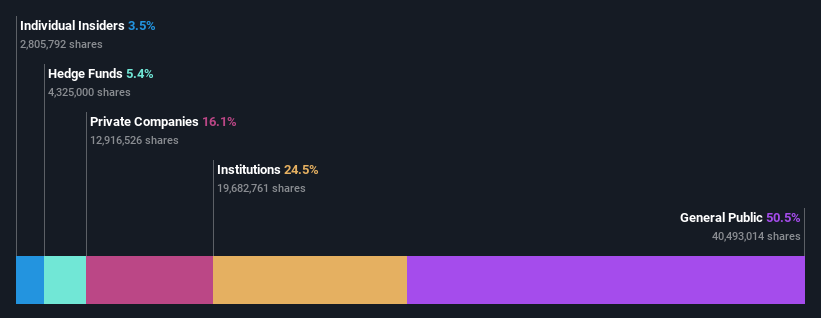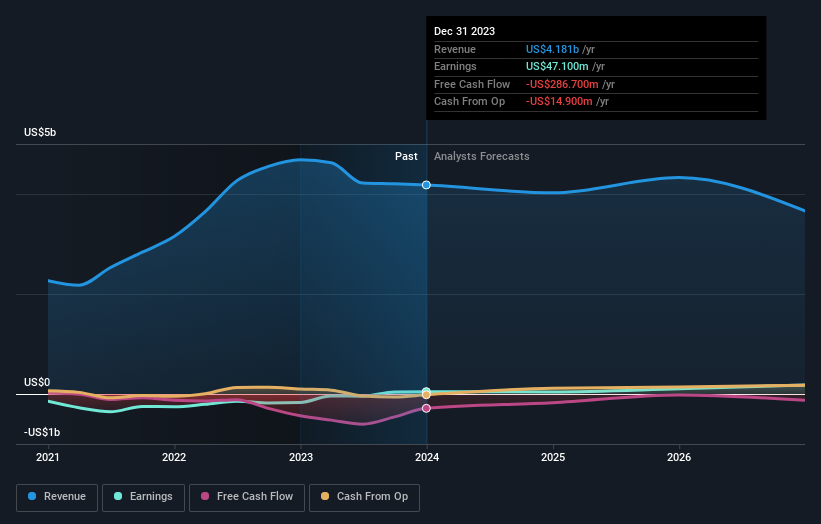Calumet Specialty Products Partners, L.P.'s (NASDAQ:CLMT) market cap touched US$1.2b last week, benefiting both retail investors who own 50% as well as institutions
Key Insights
Calumet Specialty Products Partners' significant retail investors ownership suggests that the key decisions are influenced by shareholders from the larger public
The top 25 shareholders own 46% of the company
Institutional ownership in Calumet Specialty Products Partners is 25%
To get a sense of who is truly in control of Calumet Specialty Products Partners, L.P. (NASDAQ:CLMT), it is important to understand the ownership structure of the business. With 50% stake, retail investors possess the maximum shares in the company. That is, the group stands to benefit the most if the stock rises (or lose the most if there is a downturn).
While retail investors were the group that reaped the most benefits after last week’s 4.5% price gain, institutions also received a 25% cut.
Let's take a closer look to see what the different types of shareholders can tell us about Calumet Specialty Products Partners.
Check out our latest analysis for Calumet Specialty Products Partners
What Does The Institutional Ownership Tell Us About Calumet Specialty Products Partners?
Many institutions measure their performance against an index that approximates the local market. So they usually pay more attention to companies that are included in major indices.
As you can see, institutional investors have a fair amount of stake in Calumet Specialty Products Partners. This can indicate that the company has a certain degree of credibility in the investment community. However, it is best to be wary of relying on the supposed validation that comes with institutional investors. They too, get it wrong sometimes. When multiple institutions own a stock, there's always a risk that they are in a 'crowded trade'. When such a trade goes wrong, multiple parties may compete to sell stock fast. This risk is higher in a company without a history of growth. You can see Calumet Specialty Products Partners' historic earnings and revenue below, but keep in mind there's always more to the story.
It looks like hedge funds own 5.4% of Calumet Specialty Products Partners shares. That's interesting, because hedge funds can be quite active and activist. Many look for medium term catalysts that will drive the share price higher. The Heritage Group is currently the largest shareholder, with 14% of shares outstanding. For context, the second largest shareholder holds about 8.3% of the shares outstanding, followed by an ownership of 6.8% by the third-largest shareholder.
Our studies suggest that the top 25 shareholders collectively control less than half of the company's shares, meaning that the company's shares are widely disseminated and there is no dominant shareholder.
While it makes sense to study institutional ownership data for a company, it also makes sense to study analyst sentiments to know which way the wind is blowing. There are a reasonable number of analysts covering the stock, so it might be useful to find out their aggregate view on the future.
Insider Ownership Of Calumet Specialty Products Partners
While the precise definition of an insider can be subjective, almost everyone considers board members to be insiders. Company management run the business, but the CEO will answer to the board, even if he or she is a member of it.
Most consider insider ownership a positive because it can indicate the board is well aligned with other shareholders. However, on some occasions too much power is concentrated within this group.
We can see that insiders own shares in Calumet Specialty Products Partners, L.P.. It is a pretty big company, so it is generally a positive to see some potentially meaningful alignment. In this case, they own around US$42m worth of shares (at current prices). It is good to see this level of investment by insiders. You can check here to see if those insiders have been buying recently.
General Public Ownership
The general public, who are usually individual investors, hold a substantial 50% stake in Calumet Specialty Products Partners, suggesting it is a fairly popular stock. With this amount of ownership, retail investors can collectively play a role in decisions that affect shareholder returns, such as dividend policies and the appointment of directors. They can also exercise the power to vote on acquisitions or mergers that may not improve profitability.
Private Company Ownership
Our data indicates that Private Companies hold 16%, of the company's shares. Private companies may be related parties. Sometimes insiders have an interest in a public company through a holding in a private company, rather than in their own capacity as an individual. While it's hard to draw any broad stroke conclusions, it is worth noting as an area for further research.
Next Steps:
It's always worth thinking about the different groups who own shares in a company. But to understand Calumet Specialty Products Partners better, we need to consider many other factors. Consider for instance, the ever-present spectre of investment risk. We've identified 3 warning signs with Calumet Specialty Products Partners (at least 2 which are a bit unpleasant) , and understanding them should be part of your investment process.
Ultimately the future is most important. You can access this free report on analyst forecasts for the company.
NB: Figures in this article are calculated using data from the last twelve months, which refer to the 12-month period ending on the last date of the month the financial statement is dated. This may not be consistent with full year annual report figures.
Have feedback on this article? Concerned about the content? Get in touch with us directly. Alternatively, email editorial-team (at) simplywallst.com.
This article by Simply Wall St is general in nature. We provide commentary based on historical data and analyst forecasts only using an unbiased methodology and our articles are not intended to be financial advice. It does not constitute a recommendation to buy or sell any stock, and does not take account of your objectives, or your financial situation. We aim to bring you long-term focused analysis driven by fundamental data. Note that our analysis may not factor in the latest price-sensitive company announcements or qualitative material. Simply Wall St has no position in any stocks mentioned.

 Yahoo Finance
Yahoo Finance 

